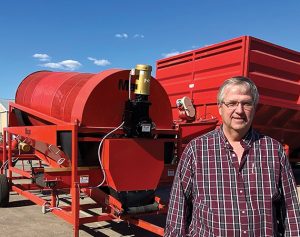The way manufacturers have used Enterprise Minnesota’s peer councils to help each other cope with the COVID economy demonstrates how these groups have evolved into one of our most effective consulting weapons.
Enterprise Minnesota’s peer councils were created 21 years ago. We recruited a group of non-competitive CEOs to meet in confidential monthly meetings to listen to a combination of topical presentations and open-ended conversations. Facilitated by Enterprise Minnesota consultants, participants function as an advisory board for each other. Today, more than 58 manufacturing executives belong to one of our councils throughout Minnesota, and we’ve expanded them to encompass operations and human resources.
I have always thought about how peer councils enable manufacturers to combine the science and the art of managing their companies. Enterprise Minnesota helps with the company’s strategic infrastructure. Our consultants have a long history of helping manufacturers lean up their operations, develop cultural environments that enhance leadership and employee development, establish strategic priorities, improve their operations, and qualify for ISO certification. And there are many others. These are valuable, long-term efforts that help our clients grow profitably.
When COVID first started to disrupt our economy early last year, we saw manufacturers adapt that internal infrastructure to current marketing conditions. We were amazed at how quickly manufacturers convened ad hoc meetings of their peer councils — instead of the half-day, in-person sessions — to address all the COVID-related uncertainties. Phone calls quickly evolved into Zoom meetings that occurred as frequently as every week. They immediately talked about the CARES Act and the Paycheck Protection Program. How should they handle masking and distancing? Should they take temperatures of employees every day? What about policies for quarantined employees or parents with children in distance learning? How should they address employee fears about job security?
How can they possibly make reasonable business forecasts about their suppliers, customers and competitors within the almost surreal ambiguities?
Bob Kill, our president and CEO, emphasized at that time that our objective should be to lead the meetings and then get out of the way.
“Our focus,” he said, “is not telling manufacturers anything but letting them share their own knowledge and experiences. That’s the power of peer councils. The focus is on the manufacturers.”
It’s happening again. The challenges of COVID have affected manufacturers differently. And the only certainty within the post-COVID economy is that there are no one-size-fits-all solutions to its unpredictable quirks.
The chronic workforce shortage lingers on as probably the most consequential problem facing manufacturers. In the near term, manufacturers still have to contend with some employees wary about returning too soon to their jobs. Parents of school-aged children continue to cope with the responsibilities of distance learning or the COVID-related shortage of accessible child care. While the recession of 2009 forced many Boomers to rethink their retirement plans, the flourishing COVID-era stock market might actually persuade long-term employees to retire, taking their in-house experience and technical expertise with them.
And then there are government interventions. There is no future for me to make value judgments about the efficacy of government policies, but there are indisputable consequences for manufacturers. Very few employee-starved manufacturers aren’t frustrated by their perception about the number of potential non-skilled workers who delay re-entering the job market because of extended unemployment benefits or the federal stimulus checks.
These peer councils will undoubtedly discuss how the rebuilding of America’s infrastructure will affect the job market. Who is going to build and repair those roads, bridges and rail lines? Construction companies, also hurting for employees, are going to provide stiff competition for workers, especially when armed with lucrative government contracts.
The bottom line: My experience tells me that resourceful manufacturers, working together, will persevere through all this and thrive once again. They always do! We at Enterprise Minnesota are pleased that our peer councils might have helped use creativity and innovation to get them there.
Manufacturing executives can learn more about peer councils by clicking here.
…
Featured story in the Summer 2021 issue of Enterprise Minnesota magazine.


